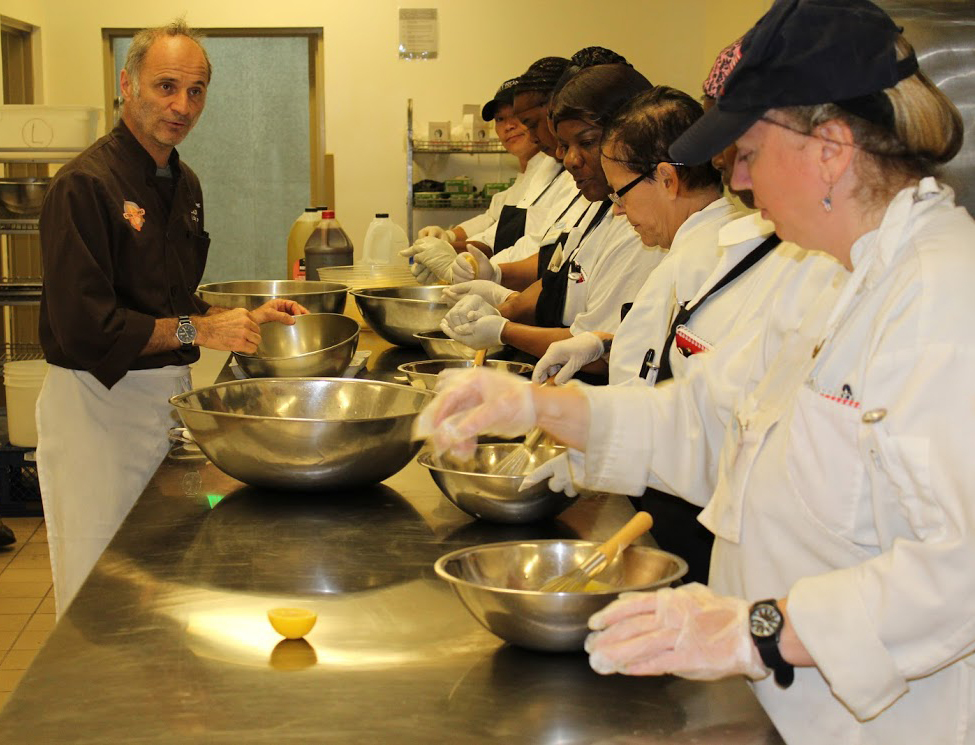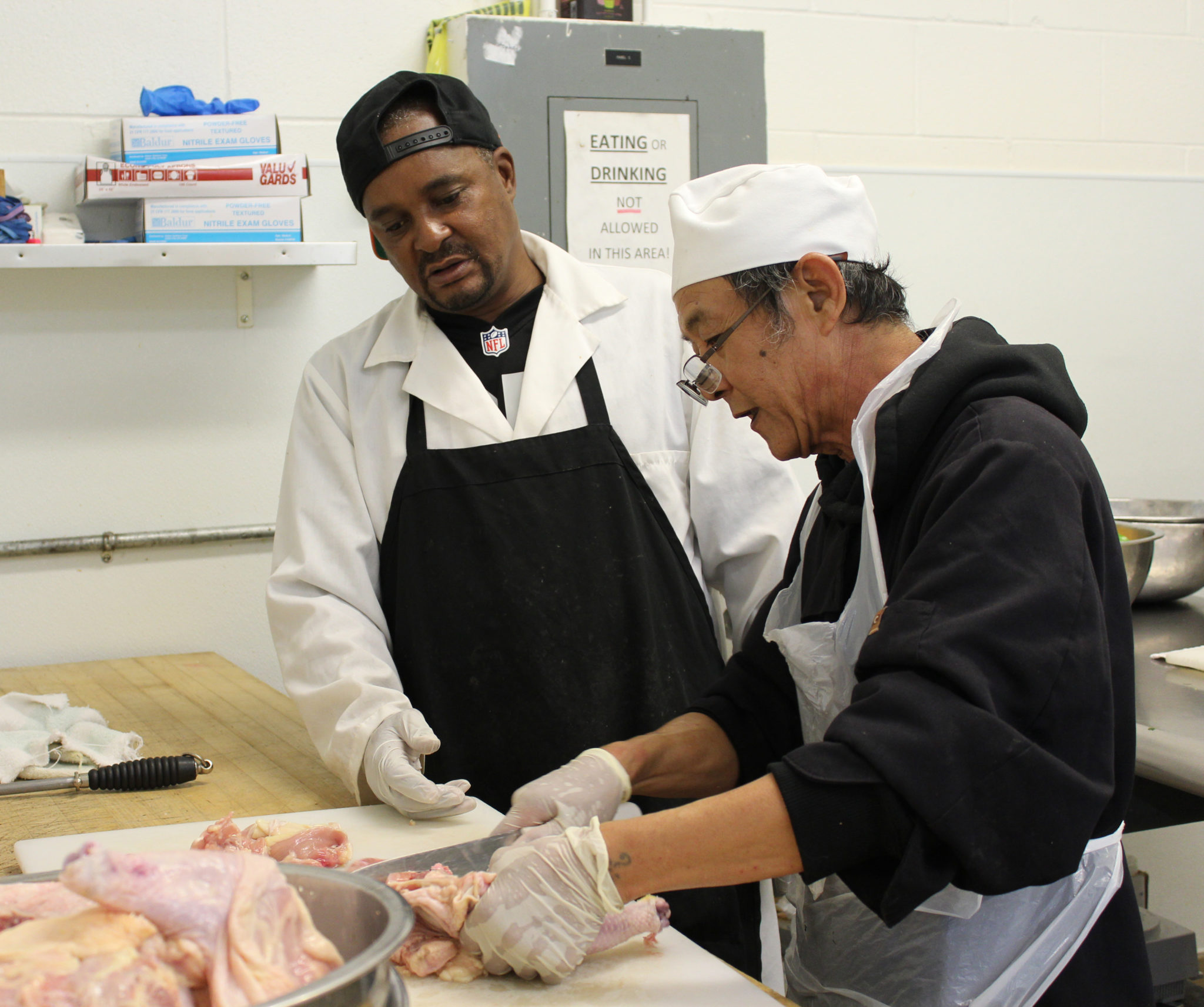 October 11, 2017
October 11, 2017
By Carmen Brick
Carmen Brick is a PhD Student in Sociology and a 2017 Berkeley Food Institute Community Engagement and Leadership Fellow.
In late 2016, I began to volunteer with the community center of St. Vincent de Paul of Alameda County, which serves a community with a family poverty rate of nearly 40 percent and visible encampments of persons experiencing homelessness. Each week, I would staff the help desk and direct the community center’s visitors to internal and external services. As I became more familiar with the community and the non-profit, I wanted to contribute more and was offered the opportunity to volunteer with the organization’s culinary workforce development program, Kitchen of Champions. I began to meet with the culinary trainees and shortly thereafter received a fellowship from the Berkeley Food Institute to assist the program in capacity building.
From the outset, I was aware of the negative judgments of workforce training programs, which are often critiqued for providing training in soft skills rather than hard skills that can help program participants gain higher wages. Critics of workforce training programs—particularly those programs targeted towards persons facing barriers to employment such as criminal records or long periods of unemployment—argue soft skills training displaces training in hard skills, acts to discipline unemployed workers to accept unfair work conditions and rewards, and reinforces perceptions of workers in low-wage industries as unskilled. Yet, what I observed was that soft skills “training”—ranging from employment services such as crafting a resume to discussing short- and long-term goals and strategies to overcome barriers—was welcomed by many program participants who wanted more support in remaking their lives.

During a workshop on goal setting, I learned that several program participants felt that they could not look to their family or friends for support in pursuing their goals and that they hoped to find that support through the workforce program. And there have been moments when I could see soft skills training visibly improve someone’s life, such as learning how to discuss negative work histories and learning how to use a computer for job searching, especially for those who had not had the opportunity to use a computer in the past. My own experience makes me wonder if it is possible for soft skills training to be reformulated toward investing in people according to their own needs and direction and away from a model in which participants are “taught” to be punctual and to follow workplace rules regardless of whether their work is adequately rewarded or whether they are treated fairly in the workplace.
 Over the past few months, I have also been able to learn more about the potential benefits of the culinary training and experience offered by the Kitchen of Champions program. Trainees spend nine weeks preparing the daily meal served free for approximately 500 people, and much of the instruction in hard skills—including knife skills, cooking techniques, and food safety—are learned on the fly. Though the culinary program appears to be a clever maximization of a particular organization’s resources, it is one of many culinary workforce training programs in the US serving people with employment barriers. Many of these programs adopt a social enterprise model in which the organization prepares meals for social service and educational providers—as does D.C. Central Kitchen—and/or operate their own restaurants and cafes—as does Fare Start in Seattle. The growth of these organizations has even led to a membership organization, Catalyst Kitchens, which supports organizational capacity building, the sharing of best practices, and the development of the workforce training-social enterprise model. On a national level, these organizations provide training to thousands of people a year, which in turn could create linkages to living wage work for people who might otherwise be shut out of employment. Though Kitchen of Champions has not yet developed the capacity to track participants’ outcomes systematically—contributing to this project is part of my fellowship—the success of a man in his 50s whom I met at St. Vincent de Paul makes me believe there is potential for change through workforce investment. When I met him, he was searching for work after a period of incarceration. Through the Kitchen of Champions program, he learned that he loves to cook, and he is now considering additional culinary training as well as pursuing a job search, supported by the program’s staff and volunteers.
Over the past few months, I have also been able to learn more about the potential benefits of the culinary training and experience offered by the Kitchen of Champions program. Trainees spend nine weeks preparing the daily meal served free for approximately 500 people, and much of the instruction in hard skills—including knife skills, cooking techniques, and food safety—are learned on the fly. Though the culinary program appears to be a clever maximization of a particular organization’s resources, it is one of many culinary workforce training programs in the US serving people with employment barriers. Many of these programs adopt a social enterprise model in which the organization prepares meals for social service and educational providers—as does D.C. Central Kitchen—and/or operate their own restaurants and cafes—as does Fare Start in Seattle. The growth of these organizations has even led to a membership organization, Catalyst Kitchens, which supports organizational capacity building, the sharing of best practices, and the development of the workforce training-social enterprise model. On a national level, these organizations provide training to thousands of people a year, which in turn could create linkages to living wage work for people who might otherwise be shut out of employment. Though Kitchen of Champions has not yet developed the capacity to track participants’ outcomes systematically—contributing to this project is part of my fellowship—the success of a man in his 50s whom I met at St. Vincent de Paul makes me believe there is potential for change through workforce investment. When I met him, he was searching for work after a period of incarceration. Through the Kitchen of Champions program, he learned that he loves to cook, and he is now considering additional culinary training as well as pursuing a job search, supported by the program’s staff and volunteers.
Given this potential, advocates and researchers focus upon food justice must learn more about the outcomes of these programs and their ability to contribute to fair employment in the food system. Too much is known about the shortcomings of workforce training programs in connecting people to living wage jobs and too much is known about the problematic labor practices of the food service industry to easily accept culinary workforce training programs as a panacea for hunger, poverty, and joblessness. Yet, some programs boast job placement rates of approximately 90 percent while aiding people with significant barriers to employment. Given the anecdotal impact of the most successful programs upon the employment opportunities of marginalized populations, too much is at stake not to investigate the true impact of these programs and whether these programs can be scaled into a workforce institution that betters the positions of workers in the food service sector.